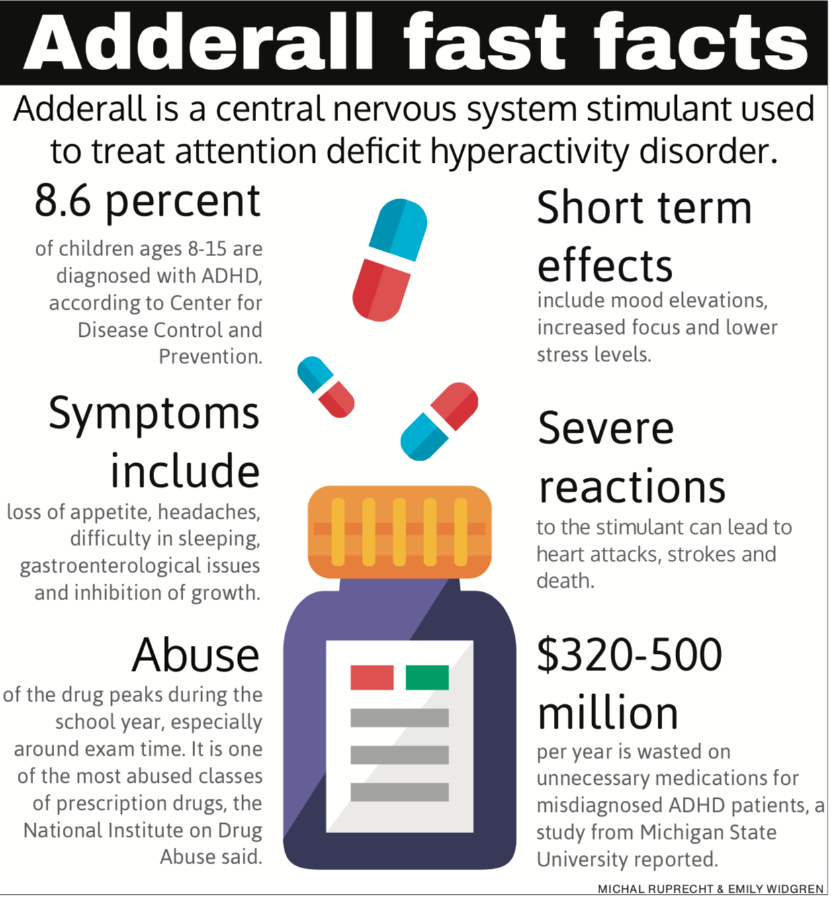Over-the-counter to under the table
Freshman Lily Becker zones out as she listens to a history lecture. But this isn’t a recurring problem — her loss of concentration at school only happens if she doesn’t take Adderall, a central nervous system stimulant used to treat attention deficit hyperactivity disorder.
Becker was diagnosed with ADHD at a young age and takes the medication daily along with 8.6 percent of children ages 8-15, according to Center for Disease Control and Prevention.
“I’m usually really hyper, and it’s always really hard to work out my school work if I don’t take my medicine. Sometimes when someone’s talking to me, I zone out, and I forget what they’re saying,” Becker said. “The negative effect, I guess, is not being able to focus on what the teacher is saying and focus on what people are saying to me most of the time.”
While it’s necessary for Becker to take Adderall, many students without ADHD take the drug, too. According to the National Institute on Drug Abuse, stimulants like Adderall are one of the most abused classes of prescription drugs. And according to the Australian Broadcasting Corporation, illegal distribution of stimulants and ADHD misdiagnosis has contributed to negative repercussions. Another study from Michigan State University found that ADHD misdiagnosis wastes $320-500 million a year on unnecessary medication.
Adderall abuse peaks during the school year, especially around exam time. Many students use the drug to become more focused on homework and during lengthy tests. ScienceDaily reported that Adderall abuse during final exams is becoming a trend among U.S. students.
Although science teacher Elizabeth Michaels said the issue isn’t pervasive, it’s serious. Michaels tries to decrease students’ stress about tests so that they are less likely to resort to using drugs like Adderall. She tries to give notices about upcoming tests and reviews material each day in class prior to big tests so students feel more prepared.
“I think just general organization skills and time management skills should be explicitly taught and paralleled with the curriculum to help students be successful as possible,” Michaels said.
Becker said she found out about Adderall abuse during a commercial about drugs. She added that she was surprised that students without ADHD take the drug.
“I don’t know why people do it because probably if they don’t have (ADHD), it’ll make them sick,” Becker said. “I think that people abusing the substance is bad when people are using it for drug purposes and need to stay away from it.”
Adderall abuse could lead to loss of appetite, headaches, difficulty in sleeping, gastroenterological issues and inhibition of growth, according to WebMD. In severe reactions to the stimulant, it can also cause heart attacks, strokes and death.
Aside from the damages to health, Adderall use by a student without ADHD is prohibited on school premises and school-related events. The ACT and SAT tests also enforce drug-related rules to ensure fairness.
Students can become addicted to the calming and focusing effects of Adderall. The National Institute on Drug Abuse said anyone with a drug addiction should get an evaluation from a physician. School psychologist Christine Kuhl said finding a professional who could help with therapy is important.
“I would hope that people with problems would seek the help and support of trusted people in their support circle,” Kuhl said. “With the support of family and friends, have the courage to seek treatment.”
Becker agrees with Kuhl. She hopes students who abuse stimulants get professional help. She added that substance abuse rules should be stringent, and school staff should be more aware of the problem.
“I think that people are damaging their own bodies, and that’s bad enough punishment because it causes brain damage and stuff if you don’t have ADHD and take the medicine,” Becker said. “I just hope they get help and get proper punishment.”


